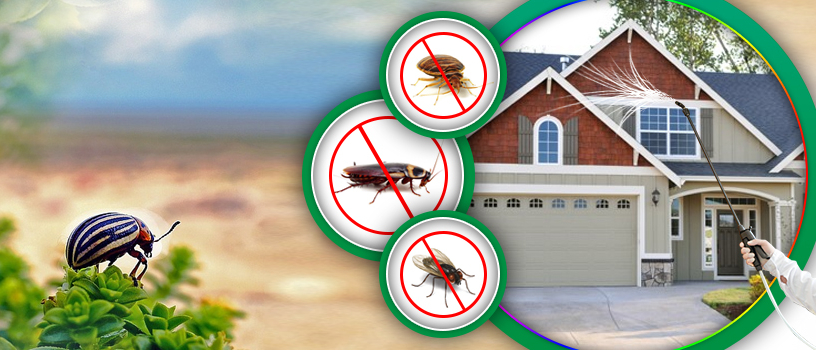Pest Control Auckland: Superior Providers for a Pest-Free Setting
Wiki Article
Recognizing Different Sorts Of Parasite Control Methods and Their Efficiency
The administration of parasites is a crucial element of preserving the health and wellness and stability of different atmospheres, from farming fields to household homes. When taking into consideration bug control techniques, it is essential to recognize the diverse techniques offered and their varying degrees of efficiency. From chemical treatments to organic services, each approach presents one-of-a-kind benefits and constraints. By checking out the nuances of these insect control strategies, a comprehensive understanding of how to resolve parasite issues can be created.Chemical Insect Control Approaches
Chemical bug control techniques play a pivotal duty in effectively handling and eradicating pest invasions in numerous environments. These methods include making use of chemical substances to eliminate or hinder parasites such as pests, weeds, and rodents. Among the key advantages of chemical bug control is its capability to supply quick and targeted remedies to pest problems. By utilizing particular chemicals that are created to target certain parasites, this method can help avoid damage to crops, structures, and human health and wellness.Nevertheless, it is necessary to take into consideration the possible dangers and disadvantages connected with chemical parasite control approaches. Overreliance on chemicals can cause the advancement of pesticide resistance in pests, making them harder to regulate in the lengthy run. Furthermore, using certain chemicals can have harmful results on non-target microorganisms, the environment, and human wellness otherwise applied correctly.

Organic Insect Control Approaches
Utilizing natural predators and microorganisms to manage bug populaces efficiently, biological pest control approaches offer a eco-friendly and sustainable strategy to pest administration. By presenting or promoting the activity of organisms that normally prey on or contaminate pests, such as ladybugs for aphid control or certain microorganisms for caterpillar infestations, organic control can aid maintain insect populaces at manageable levels without the need for synthetic chemicals. This approach is particularly useful for organic farming practices, as it prevents making use of possibly dangerous materials while keeping plant health.
Physical Parasite Control Techniques
While organic insect control approaches concentrate on using natural killers and virus, physical insect control techniques utilize mechanical and physical barriers to handle bug populations. These methods are frequently considered eco-friendly as they lessen using chemicals. Physical parasite control consists of methods such as trapping, making use of barriers like nets or displays, and physically removing get redirected here bugs from the area.Catches are typically utilized in physical bug control to capture and get rid of bugs like insects and rats. An additional physical method is the use of obstacles such as internet, fencings, or displays to avoid parasites from going into or infesting specific locations.
All-natural Pest Control Techniques
Including all-natural killers and plant-based repellents is an essential approach in executing efficient natural pest control techniques. By encouraging the existence of useful pests like ladybugs, lacewings, or aggressive termites, garden enthusiasts can naturally manage pest populaces. These predators prey on common yard bugs such as mites, caterpillars, and aphids, aiding to maintain a balanced ecological community without the need for chemical interventions.
Moreover, carrying out social techniques such as crop turning, buddy planting, and preserving proper plant wellness can likewise improve the efficiency of all-natural bug control approaches. These strategies not just aid in preventing insect invasions but likewise promote biodiversity and general ecosystem strength. By integrating these all-natural techniques, people can effectively manage pests while lessening ecological impact.
Integrated Pest Monitoring (IPM) Strategy
Carrying Out an Integrated Parasite Monitoring (IPM) approach is vital for efficiently managing insect populations while reducing reliance on chemical pesticides. IPM is a comprehensive and sustainable strategy that integrates numerous parasite control approaches to accomplish long-lasting solutions. This strategy focuses on control, prevention, read this article and tracking to resolve bug issues in an eco-friendly fashion.IPM integrates organic, social, physical, and mechanical techniques with the critical and restricted use pesticides when needed. By emphasizing positive measures such as environment alteration, biological control, and exemption, IPM intends to minimize insect populations and their effect on the community. Routine tracking is critical in IPM to evaluate pest degrees properly and establish one of the most suitable control techniques.
Among the key advantages of IPM is its capacity to decrease the threats connected with extreme chemical usage, such as environmental contamination and damage to non-target organisms. Furthermore, IPM promotes a more alternative strategy to pest management by thinking about the general community dynamics. On the whole, the IPM technique uses a efficient and sustainable service for bug control while advertising ecological responsibility.
Conclusion
To conclude, recognizing the various kinds of pest control methods and their effectiveness is vital in properly handling pest problems. Chemical, biological, physical, and all-natural pest control techniques each have their very own advantages and limitations. Integrated Pest Management (IPM) method, which integrates various methods for lasting insect control, is progressively being recognized as a holistic and ecologically pleasant remedy. By using a combination of these people, organizations and methods can successfully control insects while decreasing Full Article harm to the atmosphere.Chemical insect control approaches play a crucial role in properly managing and removing pest problems in various atmospheres.Utilizing natural predators and pathogens to manage bug populaces successfully, biological parasite control techniques supply a sustainable and environment-friendly technique to pest monitoring. By promoting the activity or presenting of organisms that normally prey on or infect insects, such as ladybugs for aphid control or particular microorganisms for caterpillar infestations, biological control can aid keep bug populaces at manageable degrees without the demand for synthetic chemicals.While organic bug control techniques focus on taking advantage of all-natural killers and virus, physical bug control techniques use mechanical and physical barriers to take care of parasite populaces. Integrated Bug Monitoring (IPM) method, which combines various methods for lasting pest control, is progressively being recognized as a ecologically friendly and alternative solution.
Report this wiki page